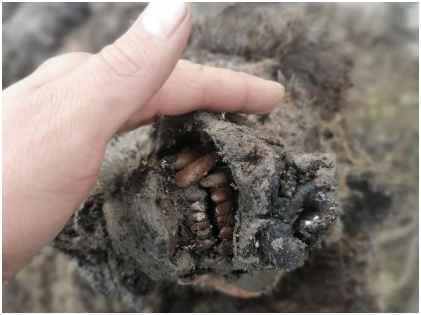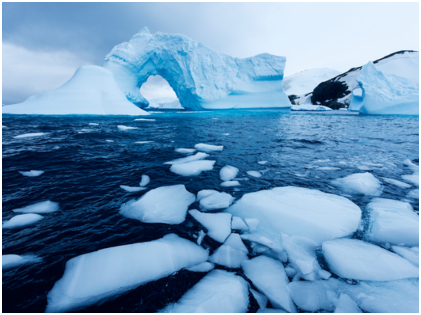While the newly sprouted coronavirus pandemic has seized the world and made you believe that you’re having the worst year of the decade, the students of science have had another golden year to celebrate. The pace of science has hardly slowed down and its achievement touched a new pick with a number of wonderful discoveries and breakthroughs in 2020. From the archaeological fact-finding of human migration from Asia to America to the production of the fastest vaccine in human history, the scientists have pulled off some impressive feats. Let’s take a close look at some of the biggest scientific discoveries of 2020.
The Migration from Asia to America is Much Older Than Expected
 Over the years, the archaeologists used to believe that early humans crossed the Bering sea to reach America was between 18,000 and 13,000 years ago via an ancient land bridge of Bering. But, the latest Discovery of human-made artifacts and stone tools in Mexico suggests that the first migration happened much earlier than expected.
Over the years, the archaeologists used to believe that early humans crossed the Bering sea to reach America was between 18,000 and 13,000 years ago via an ancient land bridge of Bering. But, the latest Discovery of human-made artifacts and stone tools in Mexico suggests that the first migration happened much earlier than expected.
It was during the last Ice Age, about 32,000 years ago, when humans made the tedious journey to cross the sea in boats not via land. At that time, the land bridge could not traversed so the only option was to pass through water. Another new discovery of giant Mammoth skeletons under a lakebed in Mexico possibly proposes the idea that after reaching the new continent, the humans may have hunted the humongous mammoths to extinction.
A Siberian Prehistoric Monster Found in Exceptionally Well-preserved State
 A corpse of the Siberian Ice Age cave bear was found by a group of researchers on a remote island in Siberia. According to a researcher of Yakutsk’s North-Eastern Federal University, The body of the prehistoric creature was found almost in a mummy condition where its soft issues are still intact.
A corpse of the Siberian Ice Age cave bear was found by a group of researchers on a remote island in Siberia. According to a researcher of Yakutsk’s North-Eastern Federal University, The body of the prehistoric creature was found almost in a mummy condition where its soft issues are still intact.
This particular species of bears were used to roam around the Siberian region during the Ice Age and scientists assume that this bear died almost 22,000 years before. Thanks to mother nature for preserving a piece of wonder for future study. Discovery of one of its kind for sure.
New Melting Glaciers in Antarctica
 While some findings are exceptionally e positive, there are few things to worry about as well. The latest evidence suggests that a couple of key Antarctic glaciers are melting, way faster than was expected. Pine Island and Thwaites, these two enormous glaciers are breaking down slowly. While some of you might be wondering that the melting pace is too slow to worry about apparently, in reality, it will cause havoc in the near future.
While some findings are exceptionally e positive, there are few things to worry about as well. The latest evidence suggests that a couple of key Antarctic glaciers are melting, way faster than was expected. Pine Island and Thwaites, these two enormous glaciers are breaking down slowly. While some of you might be wondering that the melting pace is too slow to worry about apparently, in reality, it will cause havoc in the near future.
The gigantic glaciers are known as the natural defense system of the other connected glaciers, comparatively smaller in size. These two particular glaciers could possibly increase the sea level by nearly ten feet, resulting in the submerge of various coastal cities around the world.
Coronavirus and the Creation of Its Vaccine in Record Time
 When the entire world got infected with a newfound virus called Corona, Scientists have worked their way out to produce the vaccine in a record time. Before this vaccine, the fastest vaccine in human history took almost four years to be developed. But now science proves that nothing is impossible for humans when they work on something diligently.
When the entire world got infected with a newfound virus called Corona, Scientists have worked their way out to produce the vaccine in a record time. Before this vaccine, the fastest vaccine in human history took almost four years to be developed. But now science proves that nothing is impossible for humans when they work on something diligently.
The world is being plagued with a Life-threatening virus, it was the frontline warriors and scientists that have come to the rescue. Tab biopharmaceutical companies like BioNTech and Pfizer designed the new vaccine within a year of the Coronavirus breakout. Thanks to the new vaccine technology known as messenger RNA, for which it all becomes possible.
The Innovation of Plastic-eating Super-enzymes
 Plastic, one of the most toxic elements on the planet could be recycled in a natural way. Well, at least a Group of scientists is claiming so. Recently, few researchers at the Center for Enzyme Innovation in the UK and the National Renewable Energy Laboratory, Colorado invented a new kind of enzyme that could eat away a general type of plastic, namely PET at a lightning-fast speed. This will create a whole new method of recycling plastic elements to use them again and again.
Plastic, one of the most toxic elements on the planet could be recycled in a natural way. Well, at least a Group of scientists is claiming so. Recently, few researchers at the Center for Enzyme Innovation in the UK and the National Renewable Energy Laboratory, Colorado invented a new kind of enzyme that could eat away a general type of plastic, namely PET at a lightning-fast speed. This will create a whole new method of recycling plastic elements to use them again and again.
All these discoveries suggest that science has come a long way, beyond our imagination. From taking humans to space to rescuing them from life-threatening viruses, without science it wouldn’t have been possible. But at the same time, we have to keep in mind that science cannot fix the natural wreckage done by us, humans. Science might have to travel to a great extent to save human civilization from the wrath of mother nature if we continue to exploit her.





